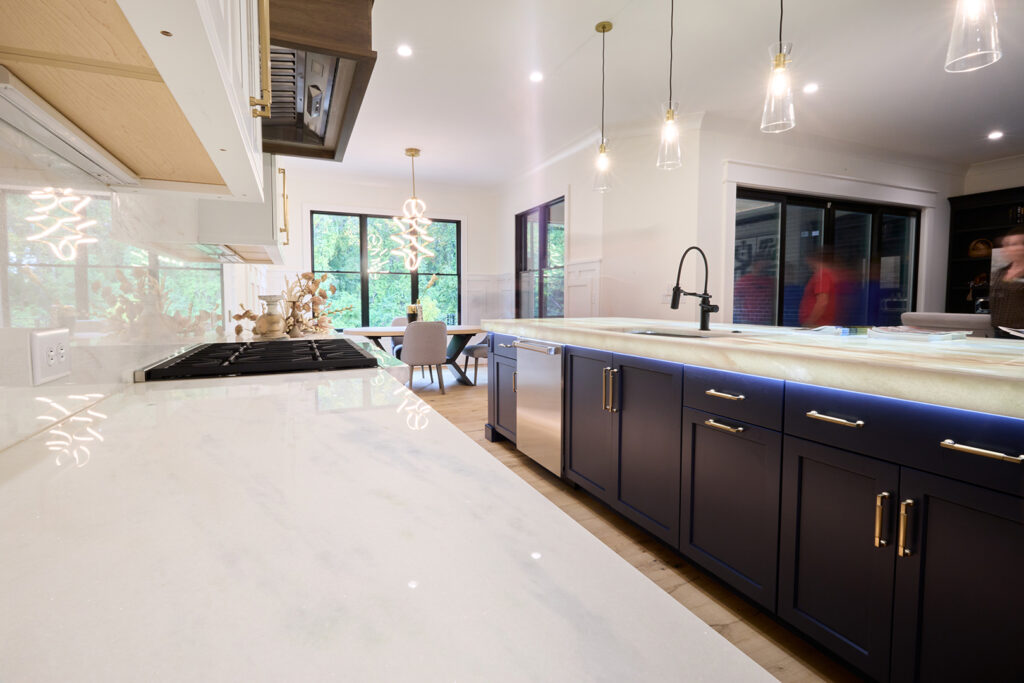When it comes to renovating your kitchen, one of the biggest decisions and investments is choosing new countertops. Countertops are one of the main focal points of any kitchen and can drastically change the entire aesthetic feel and flow of the space. While you may have a desired material in mind, it’s important to understand all of the factors that influence the pricing so you can set a realistic budget. Material choice, edge detailing, surface finish, fabricator fees, and installation complexities – all play a role in driving up or lowering the final cost.
In this blog, we will explore the various determinants that contribute to kitchen countertop pricing so you can make an informed selection that fits within your renovation budget. By understanding how costs are calculated, you’ll be empowered to negotiate offers and feel confident about the value you are getting for your investment. Let’s break down the variables that affect countertop pricing.
What Affects The Cost Of Kitchen Countertops?
The cost of your kitchen worktop (or countertop) depends on three key factors:
- Material: The type of countertop material you select, such as quartzite, marble, granite, and more.
- Fabrication: The level of effort required for cutting and shaping the chosen material.
- Countertop Installation: The process of bringing and fitting the countertop at your location.
These factors collectively determine the overall cost of your kitchen worktop, ensuring you make an informed decision while considering aesthetics, functionality, and budget.
Each section of your kitchen countertop has various factors that contribute to the final product’s price. In the upcoming sections, we will delve deeper into each section and explore the elements that drive the cost of your countertops.
Kitchen Countertop Cost: Materials
When it comes to the cost of your kitchen countertop, the choice of material is a significant factor. Not all countertop materials are created equal; they come in various types, each with unique characteristics, costs, and benefits.
Type of Material
Let’s start with the obvious – different materials have different price points. The most commonly used options include granite, quartz, marble, and quartzite. It’s true that with countertops, you get what you pay for. Hard-wearing and more luxurious materials will naturally come at a higher cost.
Brand Influence on Material Cost
The brand of the countertop material can also significantly affect its price, especially when considering engineered stones like quartz. High-end brands are renowned for their quality, extensive color options, design versatility, and durability. Their reputation is often reflected in the higher price tag of their products. These brands offer unique color palettes, patterns, and finishes exclusive to their brand. On the other hand, lesser-known or unbranded quartz options can be more cost-effective, though they may have a more limited range of color and design options. However, they can be an excellent choice for those seeking the look and durability of quartz on a tighter budget. While the brand can assure quality, it’s essential to consider factors like overall appearance, fabricator expertise, and budget.
Professional Templating and Measuring
The type of material you choose for your kitchen countertop can determine whether it requires professional templating and measuring or if you can simply order standard set lengths to be cut on-site. Laminate and wooden countertops generally come in standard set lengths, making them more forgiving and easier to manipulate. This means they can be cut to size right in your kitchen, often handled by a kitchen fitter, making it a more cost-effective option. On the other hand, stone countertops like granite, marble, and quartz are a different story. Due to their weight, cost, and unforgiving nature, they need to be precisely templated and measured by professionals. This process involves creating an exact template of your kitchen layout, including cutouts for sinks and hobs, which are then used to cut the stone slab in a specialized workshop. The precision required, along with the necessary tools and expertise, adds to the overall cost. However, it is crucial to ensure a perfect fit, and finish, and to avoid costly mistakes.
Rarity
The rarity of the material also plays a significant role in the overall cost. Some natural stones like Blue Bahia granite or Calacatta Borghini marble are relatively rare, and their procurement can significantly increase countertop costs. On the other hand, more abundant natural stones or popular colors of man-made countertops (quartz) will be less expensive, as there is a greater supply available to meet the demand.
Kitchen Countertop Cost: Fabrication
After selecting your desired material, the next cost consideration is the fabrication process. This crucial step brings your countertop to life, and various factors can impact the overall cost.
Amount Of Material
The cost of your kitchen is directly influenced by the size and countertop space required. The greater the amount of material needed, the higher the price. This encompasses factors such as the number of slabs, vertical upstands, backsplashes, and any countertop pieces needed inside cabinets.
Thickness
The cost of your countertop can also be influenced by its thickness. Thicker countertops require more materials and may require more labor-intensive installation. While most stone countertops have a standard thickness of 20 to 40mm (3/4 inch to 1.5 inches), you can opt for a thicker slab to make a bold statement, although this will increase the cost. This can be achieved either with a solid thick slab or by attaching a mitred edge to the front to create the appearance of thickness.
Finish – Polished Or Honed
The choice of countertop finishes can vary and will impact the final cost. Polished finishes, achieved through grinding and buffing the stone to a shiny surface, are generally more prevalent and may not result in additional expenses. Conversely, a honed finish, characterized by a matte and less shiny appearance, often necessitates more labor and can contribute to the overall cost.
Cuts And Features
The intricacy of your countertop design contributes to the fabrication costs. Each cut made for a sink, hob (cooktop), tap hole, pop-up socket, or drainer groove requires additional labor time. Moreover, the type of cut can also impact the overall cost.
For instance, in the case of stone countertops, undermount sinks necessitate polished cuts, whereas inset sinks do not, resulting in undermount sinks generally being more expensive.
It’s these minute details that can gradually accumulate and potentially escalate the cost if not managed carefully. However, it’s also these very details that can profoundly influence the overall design and enhance the pleasure derived from your kitchen.
Edge Profile
The edge profile you select can impact the cost of fabrication. Standard edges like eased or bevel edges are typically included in the slab cost. On the other hand, more intricate edge profiles require additional craftsmanship and can raise the price.
Under Polish On An Overhang
Opting for a design featuring an overhang, such as a breakfast bar, may prompt you to consider the polished underside of this extension. This technique, commonly referred to as under-polishing, enhances the overall aesthetic appeal. However, it is important to note that this meticulous process incurs additional fabrication costs due to the required labor.
Curves Or Radius Corners
Straight cuts are typically more cost-effective due to their simplicity. However, opting for designs with curves or radius corners will likely result in higher costs. These intricate cuts demand greater precision and time, ultimately increasing the fabrication expenses.
Kitchen Countertop Cost: Installation
The installation phase is crucial for the completion of your kitchen countertop. Once you have selected the material and completed the fabrication process, it is essential to ensure a meticulous and accurate installation in your kitchen. This step plays a significant role in determining the overall cost of the project.
Amount to Install
The installation cost will depend on the extent of the countertop required. Kitchens with larger surface areas will necessitate additional time and labor, resulting in increased expenses.
Kitchen Fitter vs Specialist
Depending on the material of your countertop, you may require either a kitchen fitter or a specialist for installation. For laminate or wooden countertops, a kitchen fitter possesses the necessary skills and tools, making the process relatively straightforward and cost-effective. However, for stone countertops like granite, marble, or quartz, a specialist is typically necessary. Due to their weight and the need for precision installation to prevent damage to the material or cabinets, stone countertops require expertise. Specialists tend to be pricier than kitchen fitters due to their higher level of skill and equipment.
Location / Building Access
The accessibility of your property and kitchen can impact the installation cost. If your home is located on a higher floor without an elevator, or if your kitchen poses logistical challenges, it can contribute to the overall installation cost. Additionally, if the installation team encounters tight corners or narrow staircases, this may result in an increased cost.
Joints
The installation cost of your countertop can also be influenced by the number of joints. Joints are the areas where two slabs meet, and achieving a smooth and seamless joint requires both skill and time. Having more joints means that more work is involved, resulting in a higher cost.
Size / Weight
The cost of installation for countertops is greatly impacted by the size and weight of the pieces. Handling and fitting larger and heavier slabs is more challenging, requiring additional manpower. Consequently, these labor-intensive requirements can drive up the installation cost. In certain instances, specialized lifting equipment may be necessary for exceptionally heavy or large pieces, further contributing to the overall installation cost.
Kitchen Countertops by Amanzi Marble & Granite
At Amanzi Marble & Granite, we understand that selecting the perfect kitchen countertop is a significant investment. We strive to provide our clients with exceptional quality and value at competitive prices. Our team of experts specializes in the fabrication and installation of marble and granite countertops, ensuring a seamless process from start to finish.
We offer an extensive selection of natural stone materials, including marble, granite, and quartzite in various finishes and edge profiles. Our skilled craftsmen use state-of-the-art equipment to ensure precision fabrication for a flawless result. We also offer professional installation services to perfectly fit your countertops. Our experienced team works diligently to minimize any potential disruptions during the installation process.
At Amanzi Marble & Granite, we take pride in delivering exceptional customer service and top-quality products. Contact us today to schedule a consultation and begin the journey toward your dream kitchen with our beautiful and durable stone countertops!




